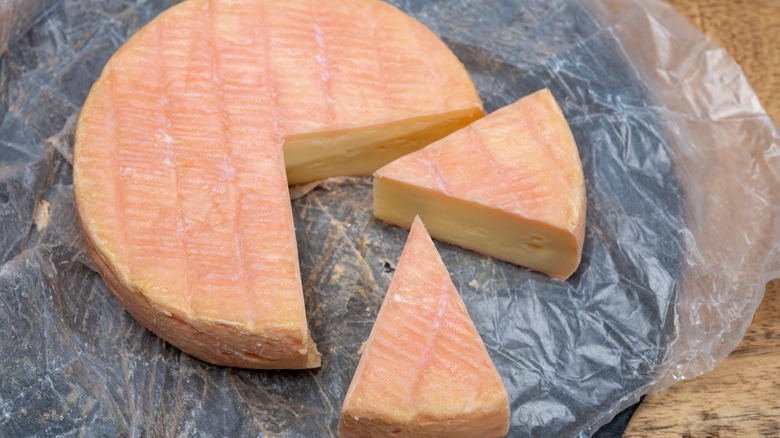No, Old Cheese Doesn't Always Have To Smell Like A Sewer
Cheese is one of those foods that you can nosh on as an appetizer or snack, or add to a variety of sandwiches and dishes to enhance a meal. After all, a burger is just a plain burger without a slice of cheddar or swiss. Macaroni would be naked pasta without its fellow namesake to wrap it in a warm, gooey, comforting blanket. Check out this curated collection of seven dinner recipes to make if you're undeniably obsessed with cheese if you need some inspiration.
There are even fondue restaurants where cheese devotees can enjoy dunking different items in a melting pot of molten deliciousness. Of course, the taste, texture, and smell of cheese can vary widely. Some are buttery and soft, while others are salty and hard. When it comes to the olfactory sense, cheese can also range from mild aromas to pungent smells that feel like a horse kick to the nose.
It might seem counterintuitive, but just because a cheese emits a powerful odor, doesn't mean that it is old or has spoiled. Old cheese doesn't always have to reek like a sewer, and some younger cheeses may overpower, depending on your smell preferences.
Who cut the cheese?
There is a scientific explanation as to why some cheeses stink and others do not, and age is not the culprit. It all comes down to bacteria, which can be incorporated into the aging process and impart a cheese its distinct smell or flavor. The rind or outer part of the cheese is generally where the bulk of the fragrance derives. In particular, stinky cheeses, often called "wash-rind" cheeses, have typically been washed with a bacteria-laden salty brine before aging. The scent may resemble ripe feet or body funk, a result of the microbes breaking down proteins in the cheese and releasing gasses, including sulfurous ones. Seriously, who cut the cheese?
If you're wondering why it smells akin to foot or body odor, it is because the bacteria contained in the brine wash are similar to ones found on our feet and skin that produce a stench. While it may smell like a locker room, cheese experts contend that this is all part of the overall sensory experience when consuming stinky cheeses. The challenging aroma pairs with a generally milder taste, which "for those who like that sort of thing, that is the sort of thing they like."

